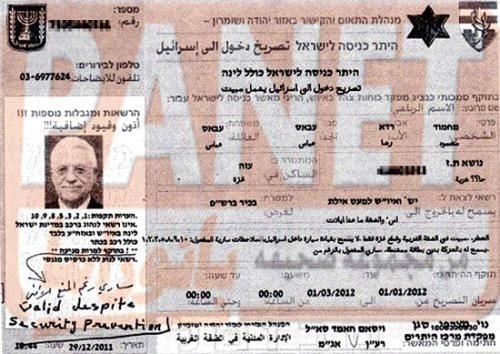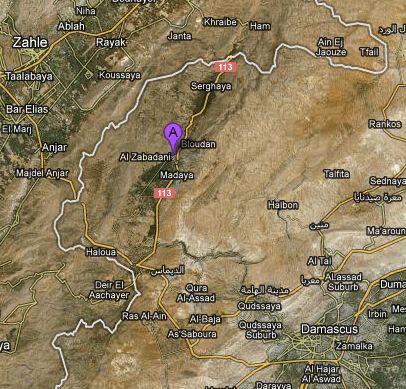 Everything you need to know about today’s media coverage of Israel and the Mideast.
Everything you need to know about today’s media coverage of Israel and the Mideast.
Why was a Hamas intelligence document leaked online? What’s the big deal about Mahmoud Abbas’s travel permit? And was a battle in a Syrian village staged for reporters and monitors?
Israel and the Palestinians
• Nadav Shragai (Israel HaYom) explains how Palestinians and Bedouins have taken advantage of citizenship laws to realize their own “right of return.”
• YNet on a Hamas intelligence snafu:
Last Wednesday, a document by the Izz al-Din al-Qassam’s military intelligence department was uploaded online. Titled “List of surrounding kibbutzim,” the document provides a detailede intelligence survey of kibbutzim and communities in the Gaza vicinity area. The list was removed hours after it was leaked.
• Israel stripped Mahmoud Abbas’s VIP travel permit, giving him a more standard two-month pass. AP quotes an Israeli calling it a glitch, adding this important caveat:
Palestinian officials acknowledged the new permit has not prevented Abbas, a frequent traveler to world capitals, from moving in and out of the West Bank.
Here’s an image of the new permit making the rounds online:

• The Sydney Morning Herald picks up on Peace Now’s latest settlement stats. She quotes the government saying the figures are exaggerated, but then correspondent Ruth Pollard raises the EU document accusing Israel of closing off a two-state solution.
Iranian Atomic Urgency
• A lot of papers picked up on Israel and the US postponing a joint military exercise that would have — among other things — simulated Israel’s ballistic missile defense. No need to aggravate an already tense situation with Iran, as the LA Times put it.

• NY Times columnist Roger Cohen worries about an Israeli strike on Iran blindsiding the US during an election year:
At this stage, the U.S. and Israeli triggers appear distinct — with Panetta saying “our red line to Iran is, do not develop a nuclear weapon” whereas the Israelis see irreversible nuclear capability as unacceptable even if a weapon is not being made. In that discrepancy lurks danger.
Don’t go there, Mr. Netanyahu. It would be a terrible mistake. Choosing between the United States and Iran is a no-brainer.
• Shibley Telhami (NY Times op-ed) calls for a Mideast nuclear weapons-free zone and opposes Israeli opacity over its own atomic program. Telhami assumes that nuclear disarmament can happen before peace.
Arab Spring Winter
• In the fog of Syria, monitors and reporters can’t tell what they’re seeing. Alexandra Zavis (McClatchy News) was under fire with the Arab League observers on the outskirts of one village:
One observer said it felt like the whole episode had been staged, but he could not say by whom. Did the townspeople push them forward to provide cover for an attack by the Free Syrian Army? Or were the security forces using them as an excuse to send in the army?
“We may never know what were the exact circumstances,” he said.

• Latest Syrian defections: The General and The Legislator.
• The Egyptian Army’s Invisible Hand: Its vast business interests hold economy in tight grip, deter it from ceding power
Rest O’ the Roundup
• The Board of Deputies of British Jews rejected a boycott of The Guardian.
• Great moments in government streamlining: Maan News reports that a PLO committee trying to reform Palestinian self-rule proposed creating two parliaments to separate the Palestinian Legislative Council from the Palestinian National Council.
PLC representatives are elected by Palestinians living in the West Bank and Gaza and hasn’t met since 2007. The PNC is a PLO body that includes the Palestinian diaspora and last met in 2009.
 • Hackers managed to knock the Tel Aviv Stock Exchange and El Al websites offline temporarily. The Jerusalem Post and YNet were contacted ahead of time by Saudi hacker 0xOmar, who says he’s been joined by a hacking team calling itself “Nightmare.”
• Hackers managed to knock the Tel Aviv Stock Exchange and El Al websites offline temporarily. The Jerusalem Post and YNet were contacted ahead of time by Saudi hacker 0xOmar, who says he’s been joined by a hacking team calling itself “Nightmare.”
Stock trading and flights weren’t effected.
• AFP: Israel and Bulgaria inked a defense cooperation agreement.
For more, see Sunday’s Media Cheat Sheet.

